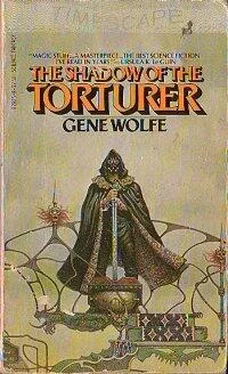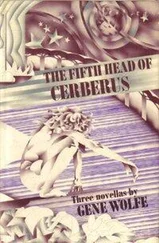“There are a good many of them,” I told him. “They find pleasure in pain, and want to associate with us just as a normal man might want to be around Dorcas and Jolenta.”
The doctor nodded. “I wondered. One can imagine an ideal servent who serves out of pure love for his master, just as one can an ideal rustic who remains a ditcher from a love of nature, or an ideal fricatrice who spreads her legs a dozen times a night from a love of copulation. But one never encounters these fabulous creatures in reality.”
In about a watch we were on the road. Our small theater packed itself quite neatly into a huge barrow formed from parts of the stage, and Baldanders, who wheeled this contraption, also carried a few odds and ends on his back. Dr. Talos, with Dorcas, Jolenta, and me behind him, led the way, and Hethor followed Baldanders at a distance of perhaps a hundred paces. “He’s like me,” Dorcas said, glancing back. “And the doctor is like Agia, only not as bad. Do you remember? She couldn’t make me go away, and eventually you made her stop trying.”
I did remember, and asked why she had followed us with such determination. “You were the only people I knew. I was more afraid of being alone than I was of Agia.”
“Then you were afraid of Agia.”
“Yes, very much. I still am. But… I don’t know where I’ve been, but I think I’ve been alone, wherever I was. For a long time. I didn’t want to do that anymore. You won’t understand this—or like it—but…”
“Yes?”
“If you had hated me as much as Agia did, I would have followed you anyway.
“I don’t think Agia hated you.”
Dorcas stared up at me, and I can see that piquant face now as well as if it were reflected in the quiet well of vermillion ink. It was, perhaps, a trifle pinched and pale, too childlike for great beauty; but the eyes were bits of the azure firmament of some hidden world waiting for Man; they could have vied with Jolenta’s own. “She hated me,” Dorcas said softly. “She hates me more now. Do you remember how dazed you were after the fight? You never looked back when I led you away. I did, and I saw her face.”
Jolenta had been complaining to Dr. Talos because she had to walk. Baldanders’s deep, dull voice came from behind us now. “I will carry you.” She glanced back at him. “What? On top of all the rest?”
He did not reply.
“When I say I want to ride, I don’t mean, as you seem to think, like a fool at a flogging.”
In my imagination, I saw the giant’s sad nod.
Jolenta was afraid of looking foolish, and what I am going to write now will sound foolish indeed, though it is true. You, my reader, may enjoy yourself at my expense. It struck me then how fortunate I was, and how fortunate I had been since leaving the Citadel. Dorcas I knew was my friend—more than a lover, a true companion, though we had been together only a few days. The giant’s heavy tread behind me reminded me of how many men there are who wander Urth utterly alone. I knew then (or thought I did) why Baldanders chose to obey Dr. Talos, bending his mighty strength to whatever task the red-haired man laid on him. A touch at my shoulder took me from my revery. It was Hethor, who must have come up silently from his position in the rear. “Master,” he said. I told him not to call me that, and explained that I was only a journeyman of my guild, and would probably never attain to mastership. He nodded humbly. Through his open lips I could glimpse the broken incisors.
“Master, where do we go?”
“Out the gate,” I said, and told myself I said it because I wanted him to follow Dr. Talos and not me; the truth was that I was thinking of the preternatural beauty of the Claw, and how sweet it would be to carry it to Thrax with me, instead of retracing my steps to the center of Nessus. I gestured toward the Wall, which now rose in the distance as the walls of a common fortress must rise before a mouse. They were black as thunderheads, and held certain clouds captive at their summit.
“I will carry your sword, Master.”
The offer seemed honestly made, though I was reminded that the plot Agia and her brother had conceived against me had been born of their desire for Terminus Est. As firmly as I could, I said, “No. Not now or ever.”
“I feel pity for you, Master, seeing you walk with it on your shoulder so. It must be very heavy.”
I was explaining, quite truthfully, that it was not as burdensome as it appeared, when we rounded the side of a gentle hill and saw half a league off a straight highway running toward an opening in the Wall. It was crowded with carts and wagons and traffic of all kinds, all dwarfed by the Wall and the towering gate until the people looked like mites and the beasts like ants pulling at little crumbs. Dr. Talos turned until he was walking backward and waved at the Wall as proudly as if he had built it himself. “Some of you, I think, have never seen this. Severian? Ladies? Have you been this near before?”
Even Jolenta shook her head, and I said, “No. I’ve spent my life so near the middle of the city that the Wall was no more than a dark line on the northern horizon when we looked from the glass-roofed room at the top of our tower. I am astounded, I admit.”
“The ancients built well, did they not? Think—after so many millennia, all the open area through which we have passed today yet remains for the growth of the city. But Baldanders is shaking his head. Don’t you see, my dear patient, that all these bosquets and pleasant meadows among which we have journeyed this morning will one day be displaced by buildings and streets?” Baldanders said, “They were not for the growing of Nessus.”
“Of course, of course. I’m sure you were there, and know all about it.” The doctor winked at the rest of us. “Baldanders is older than I, and so believes he knows everything. Sometimes.”
We were soon within a hundred paces or so of the highway, and Jolenta’s attention became fixed on its traffic. “If there’s a litter for hire, you must get it for me,” she told Dr. Talos. “I won’t be able to perform tonight if I have to walk all day.”
He shook his head. “You forget, I have no money. Should you see a litter and wish to engage it, you are of course free to do so. If you cannot appear tonight, your understudy will take your role.”
“My understudy?”
The doctor gestured toward Dorcas. “I’m certain she is eager to try the starring part, and that she will do famously. Why do you think I permitted her to join us and share in the proceeds? Less rewriting will be necessary than if we have two women.”
“She will go with Severian, you fool. Didn’t he say this morning he was going back to look for—” Jolenta wheeled on me, more beautiful than ever for being angry. “What did you call them? Pelisses?”
I said, “Pelerines.” And at this a man riding a merychip at the edge of the concourse of people and animals reined his diminutive mount over. “If you’re looking for the Pelerines,” he said, “your way lies with mine—out the gate, not toward the city. They passed along this road last night.” I quickened my step until I could grasp the cantle of his saddle, and asked if he were sure of his information.
“I was disturbed when the other patrons of my inn rushed into the road to receive their blessing,” the man on the merychip said. “I looked out the window and saw their procession. Their servants carried deeses illuminated with candles but reversed, and the priestesses themselves had torn their habits.” His face, which was long and worn and humorous, split in a wry grin. “I don’t know what was wrong, but believe me, their departure was impressive and unmistakable—that’s what the bear said, you know, about the picnickers.” Dr. Talos whispered to Jolenta, “I think the angel of agony there, and your understudy, will remain with us a while longer.”
Читать дальше










